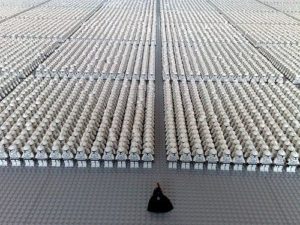It’s not often one gets the chance and obligation to say this. Brad DeLong :
Note to Self: Is there anything wrong with this analysis? With 14 deaths in the U.S., a 1% death rate, and 4 weeks between infection and death, that means that as of Feb 8 there were 1400 coronavirus cases in the United States. If it is doubling every seven days, then now about 22,000 people have and in the next week about 44,000 people in the U.S. will catch coronavirus. These numbers could be five times too big. These numbers could be five times too small. But with only 1 in 10,000 currently affected, it seems 4 or 5 weeks early to start imposing serious geographical quarantines …
No, no, no. R is not a function of the number of cases. It is only a function of herd immunity and the individual chance of transmission.
The condition for the decline and fall of the epidemic is lowering R below 1. There are two paths to this. Call them the Trump policy and the Xi policy.
Under the Trump policy of malign neglect, the virus spreads until most of the potential transmittees of the virus have recovered from it and are immune. Meanwhile, the cemeteries have filled up with those who didn’t recover. 200,000? 480,000? 1.7 million, if the hospitals collapse and the treatment is back to Black Death standards? The epidemic expires from satiety.
Under the Xi policy (also now the Moon, Conte, Sanchez, and Merkel policy), the state cuts the opportunities for transmission, including quarantines as well as contact tracing and mass preventive screening. The cost of this, direct and indirect, is fixed and independent of the number of cases. Imagine a perfect lockdown in which everybody stays in their house or flat, living out of tins by candlelight, for a fortnight: end of epidemic. This can’t be done perfectly of course, so real outcomes are a risk distribution, but you can get pretty close, as Singapore and Taiwan have shown. The death toll is still 1% or 1.6% or whatever of those infected.
It is lower the earlier you start the policy. Starting when the diagnosed cases are in the thousands, as seems to be the political trigger, looks as if it might limit ultimate deaths also to the thousands or tens of thousands. QED.

A more picturesque way of looking at this is from the point of view of the virus. It’s a clone army of dumb replicants with no leader and a single mission: reproduce. For the Virus Army as a whole, a pandemic is a death ride. At the end of it they will all be dead, apart from the small source population living quietly in non-fatal parasitism with its animal hosts. The fun part is how many non-standard hosts they can kill along the way.
No zoom in on the virus commando that has infiltrated a single human host, you. The commando is doomed. In 14 days, either you are dead (end of viruses) or your immune system has destroyed them all and you are recovered (end of viruses). Their only hope for reproduction is for some members of the commando to jump ship and invade another disarmed host. The jumping ship is nearly always fatal, as the viruses can only survive a few hours outside a host. They have no independent motility and are dependent on cooperation by the hosts: handshakes, kisses, cough aerosols, unwiped door handles. Reduce that cooperation, and the survival odds for SEAL Team Virus drop to almost nothing. That, in essence, is the Xi policy: and it works.
So where I was wrong was in assuming that social distancing would be effective? That we could impose controls for two weeks & shut this thing down, & we cannot do that?
Not sure now if I understand the deLong plan. Is it based on coercive social distancing, or voluntary? Voluntary is unlikely to be effective, there are too many selfish idiots. “This is America and I can do what I want” - actual tweet. If coercive, mobility is the first thing you want to cut, not the last. The self-isolating villagers of Eyam in 1665 had the right idea. There is always a patient zero bringing the virus to a community, and the fewer arrivals, the better the chance of staying out of it.
Since I have your esteemed attention, may I suggest using your inevitable future quarantine to think about what looks like a comprehensive failure of *economic* contingency planning for a major epidemic. Unlike with the public health measures, the failure does not seem peculiarly American. It’s not just a matter of macroeconomic offsetting but of a host of microeconomic regulations.
I was thinking about a (maybe) related issue: big companies, very wealthy individuals, make their money partially by having the economy more fluid, more globalized, more …. susceptible to these sorts of epidemics. They need to pay their damn insurance premiums. Sigh.
Although I am still pretty angry about how this has been mishandled here, I am not sure that United Statesians are incapable of a good self-isolation. The problem is, the message is staticky because of the lack of testing. If one suspects that the virus is basically all over the place already, it contradictorily kind of makes you think, what’s the point then, of staying home? I might have it already. And on the other hand, very few of us know anyone who has it yet, or so we think (as there are so few tests). Human beings are not rational most of the time. I know people who think it’s nonsense. I kind of don’t blame them too much (while I try to stay away from them).
However, if we had been in a position to have better data, I think most people would do the right thing. I think a lot of them are doing it now even with the uncertainty.